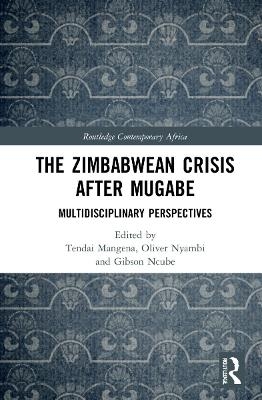
The Zimbabwean Crisis after Mugabe
Routledge (Verlag)
978-1-032-02814-9 (ISBN)
This book examines the ways in which political discourses of crisis and ‘newness’ are (re)produced, circulated, naturalised, received and contested in Post-Mugabe Zimbabwe.
Going beyond the ordinariness of conventional political, human and social science methods, the book offers new and engaging multi-disciplinary approaches that treat discourse and language as important sites to encounter the politics of contested representations of the Zimbabwean crisis in the wake of the 2017 coup. The book centres discourse on new approaches to contestations around the discursive framing of various aspects of the socio-economic and political crisis related to significant political changes in Zimbabwe post-2017. Contributors in this volume, most of whom experienced the complex transition first-hand, examine some of the ways in which language functions as a socio-cultural and political mechanism for creating imaginaries, circulating, defending and contesting conceptions, visions, perceptions and knowledges of the post-Mugabe turn in the Zimbabwean crisis and its management by the "New Dispensation".
This book will be of interest to scholars of African studies, postcolonial studies, language/discourse studies, African politics and culture.
Tendai Mangena (PhD) is Associate Professor in African Literary and Cultural studies at Great Zimbabwe University and Research Fellow in the Department of English at the University of the Free State, South Africa. She was a Fulbright Research Scholar in the Department of Comparative Literature and Languages at the University of California, Riverside, USA, in 2020 and an Alexander von Humboldt Postdoctoral Fellow in the Department of Postcolonial Literary and Cultural studies at Bremen University, Germany, from 2016 to 2018. Her research interests are in the areas of gender, politics, power, and justice in African literature and onomastics. Oliver Nyambi (PhD) teaches English and Cultural Studies in the Department of English, University of the Free State, South Africa. He is currently an Alexander von Humboldt Research Fellow hosted by Susan Arndt in The Professorship of English Studies and Anglophone Literatures at Bayreuth University, Germany. A former fellow of the American Council of Learned Societies (ACLS) and the Duke Africa Initiative at Duke University, USA, his research mainly focuses on crisis/ humanitarian literatures, the Zimbabwean crisis and the cultural politics of marginalities. His recent book is Life-Writing from the Margins in Zimbabwe: Versions and Subversions of Crisis (2019, Routledge). He is an editor with Cogent Arts & Humanities – the open-access journal published by Routledge. He is a rated researcher with the South African National Research Foundation (NRF). Gibson Ncube (PhD) teaches French in the Department of Modern Foreign Languages at Stellenbosch University. He is also an Iso Lomso Research Fellow at the Stellenbosch Institute for Advanced Study (South Africa). He is an alumnus Fellow of the African Humanities Programme (American Council for Learned Societies). His research interests are in comparative literature, gender and queer studies and cultural studies. He sits on the editorial boards of the Journal of Literary Studies, Nomina Africana as well as the “Governing Intimacies in the Global South” Book Series at Manchester University Press. He is the Assistant Editor of the South African Journal of African Languages and is a coconvenor of the Queer African Studies Association. He is a Y1-rated researcher by the National Research Foundation of South Africa.
Introduction: Negotiating the Zimbabwean crisis post-Mugabe (Gibson Ncube, Oliver Nyambi and Tendai Mangena) Part 1: Negotiating memories of Mugabe and the past Chapter 1: Burying or erasing Mugabe? A crisis of memory in the New Dispensation (Tendai Mangena and Gibson Ncube) Chapter 2: Raising her bones: Contextualising the politicisation of Nehanda’s legacy in the post-Mugabe era (Shingi Mavima) Chapter 3: (Un)settling bones: Abstruse liberations and re-gendered commemorations in Panashe Chigumadzi’s These bones will rise again (Oliver Nyambi) Chapter 4: The toponymic undoing of Grace Mugabe and the G40 narrative in the New Dispensation: A political semiotics exegesis (Zvinashe Mamvura, Mickson Mazuruse and Innocent Mupandasekwa) Chapter 5: Rituals of revolution? Place renaming and the crisis of transition in Zimbabwe (Dorcas Zuvalinyenga) Part 2: Discourses of transition and legitimation in popular spaces Chapter 6: The discursive legitimation of the 2017 coup in Zimbabwe’s mainstream newspapers (Mphathisi Ndlovu and Vimbai B. Chinembiri) Chapter 7: The mediatised image of Robert Mugabe during the 2017 Zimbabwean coup (Hugh Mangeya) Chapter 8: Social media, COVID-19 and the ‘Second Republic’ in Zimbabwe: Memes as instruments of subversion on President Mnangagwa’s Facebook page (Rodwell Makombe) Chapter 9: Song, patriotism and (il)legitimacy: The politics of transition in post-Mugabe Zimbabwe (Tavengwa Gwekwerere) Chapter 10: Politics, protest and music in the Second Republic: The subversive aesthetics of Winky D’s post-coup songs (Doreen R. Tivenga) Part 3: Discursive interventions of political transition Chapter 11: Military-assisted transition, the New Dispensation and the facade of change in Zimbabwe post-Mugabe (Wesley Mwatara and Munyaradzi Nyakudya) Chapter 12: Bounded reasoning and the complexity of change in governance: reflections on post-2017 Zimbabwe (Dennis Masaka) Chapter 13: The New Dispensation and the Second Republic: Discoursing transition in the post-Mugabe era (Tsiidzai Matsika) Chapter 14: Semanticising the ‘new’ in the New Dispensation: Discourse and the politics of nationalist renewal in post-2017 Zimbabwe (Sambulo Ndlovu)
| Erscheinungsdatum | 04.01.2022 |
|---|---|
| Reihe/Serie | Routledge Contemporary Africa |
| Zusatzinfo | 2 Tables, black and white; 1 Halftones, black and white; 1 Illustrations, black and white |
| Verlagsort | London |
| Sprache | englisch |
| Maße | 156 x 234 mm |
| Gewicht | 453 g |
| Themenwelt | Geisteswissenschaften ► Sprach- / Literaturwissenschaft ► Literaturwissenschaft |
| Sozialwissenschaften ► Kommunikation / Medien ► Medienwissenschaft | |
| Sozialwissenschaften ► Politik / Verwaltung ► Vergleichende Politikwissenschaften | |
| ISBN-10 | 1-032-02814-9 / 1032028149 |
| ISBN-13 | 978-1-032-02814-9 / 9781032028149 |
| Zustand | Neuware |
| Haben Sie eine Frage zum Produkt? |
aus dem Bereich


